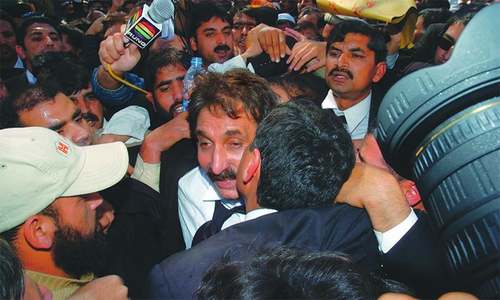ISLAMABAD: A senior counsel representing a former top boss of Islamabad police has pleaded before the Supreme Court that he will not argue but resort to “tarla” (begging) for seeking forgiveness of the top court hearing a contempt case against his client for roughing up a former chief justice.
“I am even going a step forward by expressing profound apology with folded hands and holding my ears and am even ready to scratch lines with nose,” Dr Khalid Ranjha, who represents former inspector general of Islamabad police Chaudhry Iftikhar, said in the court on Tuesday.
When Mr Ranjha said that there were no arguments when one resorted to “tarla”, Justice Sheikh Azmat Saeed, a member of the bench, remarked in a lighter note that the court had understood the counsel’s argument in the Punjabi language.
A five-judge Supreme Court bench headed by acting Chief Justice Asif Saeed Khosa, however, reserved its ruling, with a direction to all the accused facing contempt charges to remain present in the court the day when the fate of their intra-court appeals (ICA) would be announced.
The larger bench had taken up a set of ICAs moved by seven former senior members of the capital administration and police personnel convicted of roughing up former chief justice of Pakistan Iftikhar Muhammad Chaudhry on March 13, 2007.
The appeals were moved against the Nov 1, 2007 order of the Supreme Court which had sentenced Islamabad’s senior administration officials and police personnel for manhandling the former CJP by preventing him from marching towards the apex court to answer the allegation of misuse of office before the Supreme Judicial Council (SJC). But soon after announcement, the convictions were suspended for 15 days on the request of the convicts for filing appeals against the punishment.
Former Islamabad chief commissioner Khalid Pervaiz and deputy commissioner Chaudhry Mohammad Ali were sentenced till rising of the court, former inspector general of Islamabad police Chaudhry Iftikhar Ahmed and senior superintendent of police retired Captain Zafar Iqbal were sentenced to 15 days in jail and deputy superintendent of police Jamil Hashmi, inspector Rukhsar Mehdi and assistant sub-inspector Mohammad Siraj to one-month imprisonment.
Later a 10-member bench barred the respective departments from taking any adverse action against the appellants till pendency of the appeals.
On Tuesday, Justice Khosa repeatedly asked the counsel to explain the yardstick to assess that the apology tendered by an accused was genuine and offered in a bona fide manner instead of a ploy to get rid of the contempt proceedings.
So many incidents had happened recently where abuses against the judiciary had been hurled by high dignitaries of the government and when called they simply offered apology, Justice Khosa recalled, adding that one of the tests to prove that the accused genuinely felt remorse was to tender his resignation by stating that he was no longer able to serve. But here the accused tendered apology that too one month after the incident and after he was indicted.
When contempt cases were taken up, Justice Khosa explained, the court had its eyes on future to discourage events like these in the next 100 years, adding that the highest possible contempt of court was roughing up a chief justice of Pakistan.
However, the judge hastened to add that the court was always careful to remove any misgiving of being vindictive rather always inclined towards clemency in such cases.
Justice Sheikh asked the counsel that even if the court was convinced that the apology tendered was with bona fide intent, did it automatically bind the court to accept it.
The counsel pleaded that the instant case should not be construed or equated with that of a crime committed but a case to restore the majesty and dignity of the court.
The counsel recalled that former president retired Gen Pervez Musharraf had in a hand-written statement tendered apology by stating that he was even ready to come to the court not on his foot but on hands when Justice Shafiur Rehman had summoned him on contempt charges.
That was how he got promoted to eventually become the chief of staff of the armed forces, quipped Justice Khosa.
Additional Attorney General Sajid Ilyas Bhatti argued that the court enjoyed the discretion either to accept or reject the apology no matter the apology was tendered in a bona fide manner or the conduct of the accused was remorseful.
Later senior counsel Abdul Shakoor Paracha and Sardar Aslam argued to represent former superintendent of police retired Capt Zafar Iqbal and chief commissioner Khalid Pervez and deputy commissioner Mohammad Ali, respectively.
Published in Dawn, May 16th, 2018











































